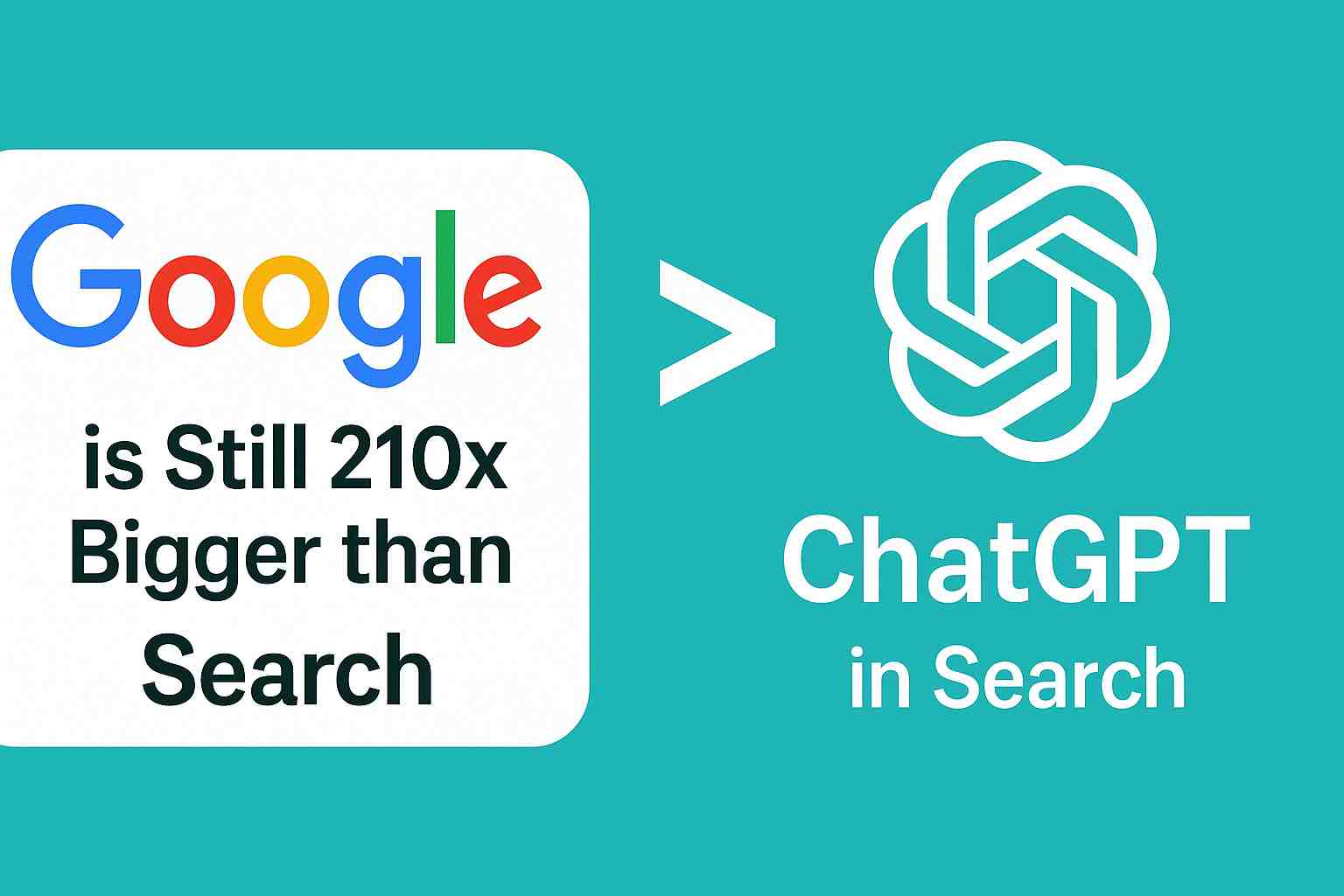When it came to searches between 2021 and early 2022, Google had held the number one position since for centuries. Yet are we hearing that ChatGPT is the new Google-anything lately anyway?
If you have been online recently, all you would have seen is the buzz surrounding AI tools like ChatGPT. Some feel ChatGPT might just be the new place to search, replacing Google. Yet here is the shocking fact: in terms of search traffic, Google is still 210 times bigger than ChatGPT. That is not a small margin; that’s a huge one! Certainly, that said, it gives us an idea regarding user behaviors in the online world, whom they trust, and also, where maybe the current big competition in search could even be.
What does 210x bigger really mean for Google?
The one saying it is 210 times bigger is bigging-up monthly search queries. On the whim of its users, Google would carry out billions of search queries, and ChatGPT is still a minuscule drop in that ocean. In other words, while the way ChatGPT headlines in a way or another has changed how some pick up on information, it is not still at large a new way to go against “Googling” for any backdrop of information.
“In a nutshell, AI-search engines may grab quick attention, but the long march for behavior change has just begun,” said the strategist.
So is it to say that Google will not feel the presence of ChatGPT as a threat?
Not really. ChatGPT is carving out its own niche. Rather than trying to lock heads against Google, it is now changing the face of online search by feeding direct conversational answers rather than long lists of links-a major change. Yet Google cannot, and really does not wish to, be outdated; instead, it is into launching an AI-powered search experience (i.e., Search Generative Experience).
The so-called “future of search” may, therefore, not be about trimming one down but rather about the symbiotic existence of the two: Google will instill AI within its search engine, whereas ChatGPT will foster a personalized search approach.
Why does one confine oneself to using Google in the presence of ChatGPT?
Very good question, with simple answers:
Habit and trust: For almost two decades, people would just type their questions into Google. Such trust just cannot be brushed away in a matter of days.
Coverage: With Google, you get practically entire world-wide-web coverage; with ChatGPT, on the other hand, you have the restraints of training data and hence cannot furnish the latest info.
Verification: With Google one can cross-check sources; ChatGPT gives just one conversational answer.
The whole process nowadays, at least, has been adapted, however: “Google for an overview; ChatGPT for the quick answers.”
Will AI affect the future search?
And this is where the interesting part starts. Some experts say AI will not kill the traditional search but will rather change the way we use it.
Content strategist Nina Lopez put it perfectly: “The real winners will never be AI tools or search engines alone. It would always be those who combine the two seamlessly to gain user trust and convenience.”
Generative AI development services were meant to be everywhere, anywhere from shopping searches to customer support.
What should businesses do to prepare then?
If you run your own business or want to create content, then that should be a takeaway for you.
Start optimizations for the giant: Google.
Observe AI search engines and test out several methods to check for visibility of your brand.
Create content and provide solutions to humans and the AI equally.
You can get in deep with AI and SEO using our guide to Generative Engine Optimization. Keep yourself updated on SEO with our write-up of What 10X Content Is.
FAQs
Q1. Will ChatGPT replace Google in 2025?
Currently, it just began shifting user behavior to a very small degree, and inappropriately so, the large remain would be Google.
Q2. Why does Google still remain 210 times bigger than ChatGPT?
Google executing transactions worth billions spells of searches every day, whereas ChatGPT is catering to a very small set of people with special interest.
Q3. Can businesses use ChatGPT for search?
An example: customer-oriented inquiries necessarily call for conversational SEO, but Google is still our main agent for our search.
Q4. What is the future of search-facing AI?
The answer lies in a traditional-plus-AI search: Google remains number one while the AI tools try to refine the user experience.
Q5. Should we be marketing to these AI agents?
For sure, but SEO for Google should never be forgotten as it is still driving in the greatest amount of traffic.
Conclusion
So, while Google is still 210x bigger than ChatGPT in search, the story isn’t about size alone it’s about direction. The future of search looks less like a battle and more like an evolution where Google stays dominant but AI tools like ChatGPT shape how we expect answers.
What do you think will you trust AI more than Google in the next few years? Drop your thoughts in the comments!
Kumar Swamy is the CEO of Itech Manthra Pvt Ltd and a dedicated Article Writer and SEO Specialist. With a wealth of experience in crafting high-quality content, he focuses on technology, business, and current events, ensuring that readers receive timely and relevant insights.
As a technical SEO expert, Kumar Swamy employs effective strategies to optimize websites for search engines, boosting visibility and performance. Passionate about sharing knowledge, he aims to empower audiences with informative and engaging articles.
Connect with Kumar Swamy to explore the evolving landscape of content creation!
